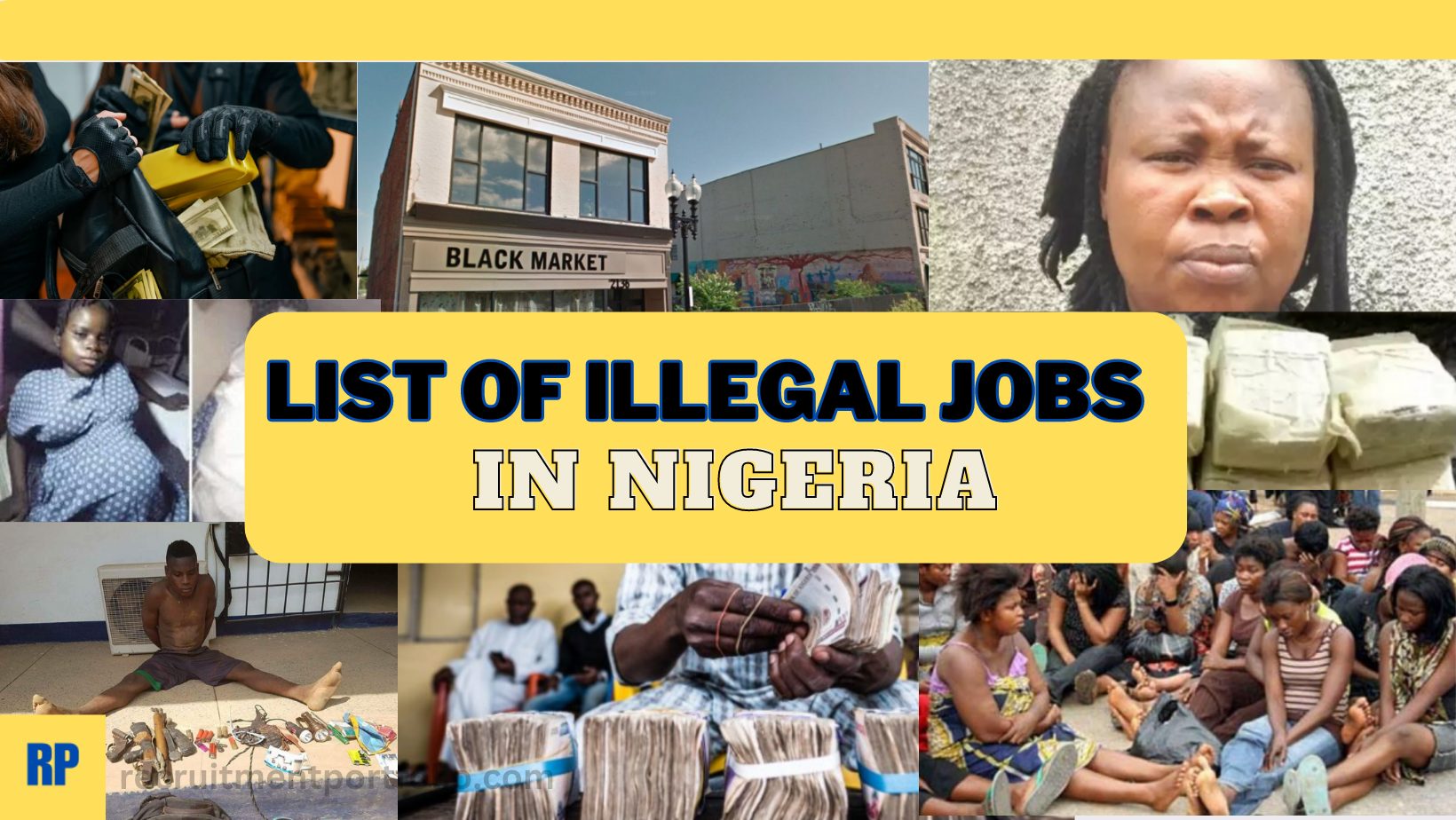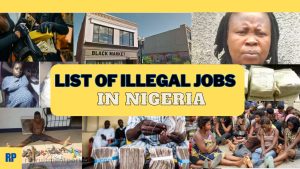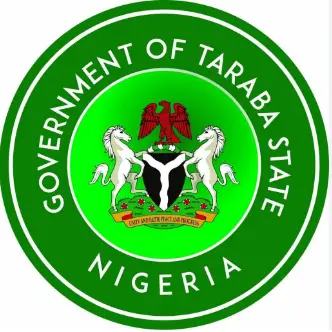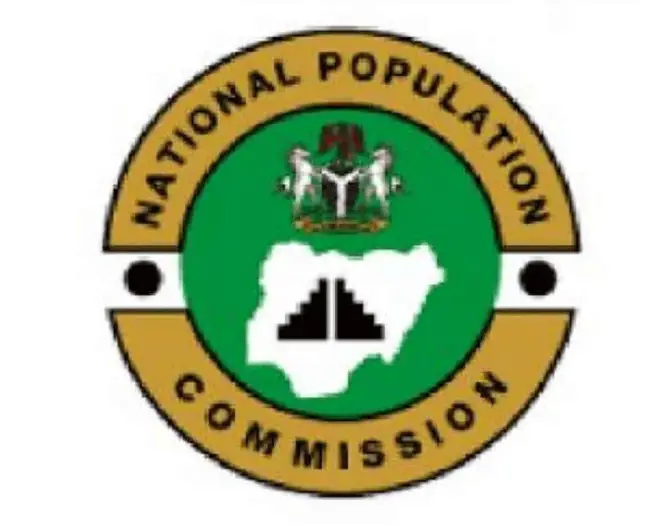
List of Illegal Jobs in Nigeria (2024) | Jobs to Avoid
List of Illegal Jobs in Nigeria
Illegal Jobs in Nigeria: Most traders and/or business owners in Nigeria do not know that the job they do to be able to afford their day-to-day living expenses is considered illegal. This is because it is not registered with the government and thus no tax is charged to the business.
While ignorance is not an excuse in the eyes of the law, it is safer to avoid being caught with an illegal business at all. Below are some businesses which are considered illegal in Nigeria and ways you can turn them to become legal. So, you may avoid them, shut them down (if you have already started), or turn them into legal businesses.
Recruitment Opportunities You Should Definitely Check Out For
- NIMASA Recruitment
- NEPC Recruitment
- Latest on Nigerian Customs Service Recruitment
- KPMG Graduate Trainee Recruitment
- OAKLEAF Partnership Recruitment
- NAPTIP Recruitment
- MTN Recruitment – Customer Service Rep
What are Illegal Jobs?
Illegal Jobs are those jobs that are not reported to the government or that are considered unconstitutional as proclaimed by the Criminal Law Act. They are jobs that are done in such a way as to avoid or evade paying taxes. They are also jobs which violate laws such as collecting unemployment benefits when you are employed.
Illegal job is also known as:
- Unreported employment,
- Money under the table,
- Working under the table,
- Off-the-books job,
- Cash-in-hand.

List of Illegal Jobs in Nigeria
Below is the list of jobs considered illegal in Nigeria:
- Selling of Contraband goods
- Black Market
- Online Fraud
- Illegal Construction
- Illegal Logging
- Illegal Mining
- Illegal Taxi Operation
- Drug Trafficking
- Fencing
- Bank Robbery
- Illegal Casino
- Con Artistry.
- Hacking.
- Arms Dealing.
- Pimping.
- Cargo Theft
- Human Trafficking
- Stolen Oil.
- Counterfeits.
Visit HERE to check out Recruitment Opportunities.
- Selling of Contraband goods
This means selling goods or products that its possession, production, exportation, or importation is forbidden in Nigeria. According to CBN’s Official Window and the Nigeria Customs Service (NCS), the following items are ineligible for foreign exchange in Nigeria:
- Margarine.
- Cement.
- Rice.
- Meat and processed meat products.
- Palm oil products or Palm kernel or vegetable oils.
- Vegetables.
- Processed vegetable products.
- Poultry and poultry products.
- Private aeroplanes and jets.
- Mosquito-repellant coils.
- Air pistols.
- Second-hand clothing.
- Toxic wastes and Nuclear Industrial waste.
- Black Market
This means selling goods or products that are not legally allowed to be sold or bought. It also means selling core products that are artificially scarce but needed by everyone. An example is selling fuel or exchanging foreign currencies in the black market. Another good example is food that was being sold on the black market during the war.
- Online Fraud
Online fraud, also known as internet fraud, means committing fraud through email, websites, message boards, or chat rooms. It occurs when fraudsters reach their prospective victims through the aforementioned platforms and lure them to release funds to them through false pretences. It also occurs when proceeds of fraud are transmitted to offshore financial institutions.
- Illegal Construction
This is when engineers and other construction workers begin to erect a building without a valid construction permit from the right authority. Uncontrolled construction sites are prone to potential technical hazards and can be a major environmental violation.
- Illegal Logging
This means harvesting, transporting, purchasing or selling timber in a way that violates the law. It also means using corrupt means having access to forests or protected areas to extract timbers in excess of agreed limits or cut down protected species.
- Illegal Mining
This occurs when one mine in a place without taking permission from the necessary authorities like the State government. For example, if the miner does not obtain land rights and mining licenses from the state or he explores without a mineral transportation permit.
- Illegal Taxi Operation
In every state in Nigeria, taxis are required to have the necessary permission or license from the jurisdiction they operate. Nevertheless, those that have obtained the license or permission are not to use it for illegal activities such as pirating, kidnapping or stealing from unsuspecting victims.
- Drug Trafficking
Every process that is involved in manufacturing and distributing illegal drugs falls under the crime of drug trafficking. Thus, whether you are caught in possession, producing, selling, or even taking illicit drugs, you will be charged with the crime of drug trafficking.
- Fencing
Fencing is a sport where two opponents fight each other with swords like foils, sabres, and epees according to some rules. Where it becomes illegal is where it involves betting and causing physical harm to your opponent in order to win some money.
- Bank Robbery
According to section 402 of the Criminal Code Act, bank robbery is a federal crime in Nigeria whereby masked or unmasked individuals take or attempt to take by force something of value from the custody, control or care of a bank branch. The punishment for bank robbery in Nigeria is 21 years imprisonment. If the offender is armed with dangerous or offensive weapon(s), he/she will be sentenced to death.
- Illegal Casino
Casino owners run gambling establishments without proper licensing from the government. These lawbreakers are sometimes difficult to catch as it takes proper understanding and analysis of state and federal gambling laws to convict them.
- Con Artistry
This is the act of manipulating, tricking or cheating others by using the art of persuasion to make them believe something that is not true. The consequence of that act is that the victims end up losing all of their hard-earned money to these con artists.
It is an illegal job in Nigeria and is punishable by the law.
Click HERE to Check Out the Latest Job Opportunities
- Hacking
Hacking is a situation whereby a skilful or enthusiastic computer user or programmer uses his/her technical knowledge of the computer to gain unauthorized access to the data in someone else’s system. The hacker usually introduces a virus into the system, steals valuable information, or asks the computer owner for ransom in exchange for removing the ransomware. This activity is not always malicious. However, the term has been identified as being negative due to its relationship with cybercrime.
- Arms Dealing
Arms dealing means buying, selling or brokering illegal arms deal between individuals, governments, or companies. In Nigeria, it is not lawful for anyone to sell, buy or manufacture firearms or ammunition. Only a duly documented and registered individual with proper permission from the Inspector General of Police can make or repair firearms in Nigeria.
- Pimping
Pimping is when a man or a woman arranges meetings between a client and a prostitute in exchange for a financial reward or monetary consideration. Both prostitution and pimping is illegal in Nigeria as provided in Section 77 of the Criminal Code Act.
- Cargo Theft
Cargo is goods carried on a motor vehicle, aircraft or ship. Cargo theft means stealing any cargo that belongs to a commercial shipment from the storage facility where it is kept or from the platform in which it is transported. The things stolen can vary from baggage, cars, money, chattels, or goods.
- Human Trafficking
This is the act of deceiving or coercing people with the promise of a better life but transporting them and exploiting them sexually or through forced labour. Human trafficking is illegal in Nigeria and the agency created to combat this crime is NAPTIP.
- Stolen Oil
This is the crime whereby people with authority and armed groups sell oil that belongs to the people. The proceeds gotten from the sale are not used for the people but rather used to sponsor terrorism, conflict, corruption and repression.
- Counterfeits
This means the remaking of an authentic product or brand with the aim of destroying, stealing, or replacing the original. The individual sells the fake product or brand; thus deceiving customers to believe that the fake is of higher or better value. This is a form of misrepresentation and is considered illegal in Nigeria.
Receive Recruitment Updates Through Our Social Media Channels.

2023 Recruitment Opportunities.











